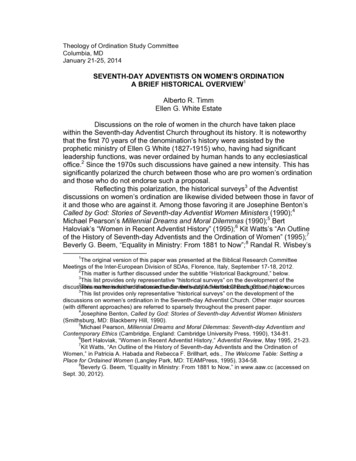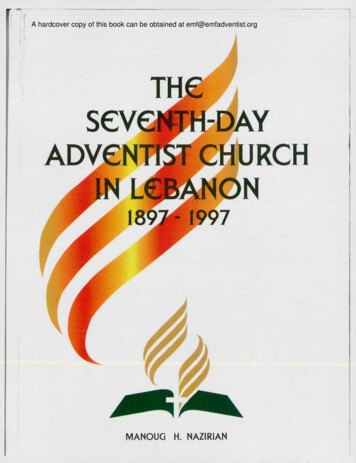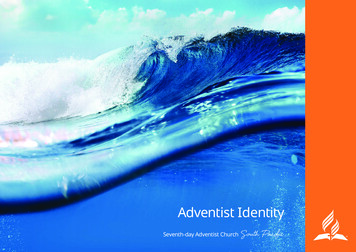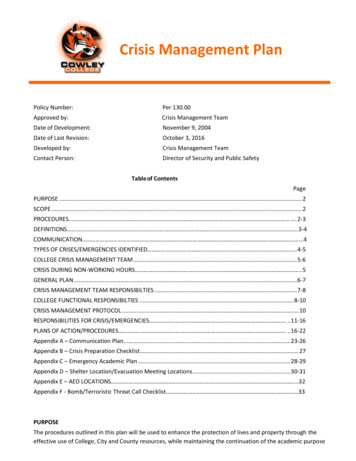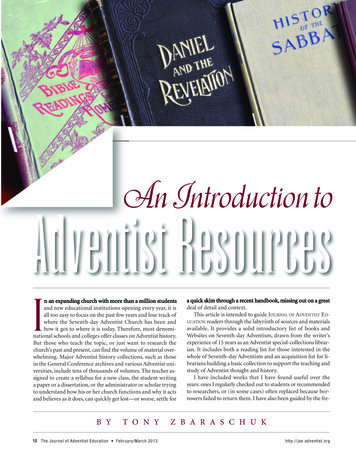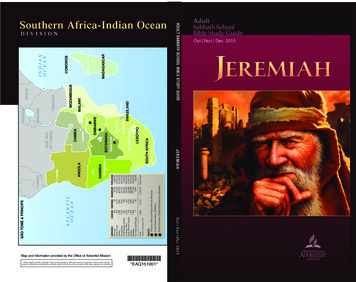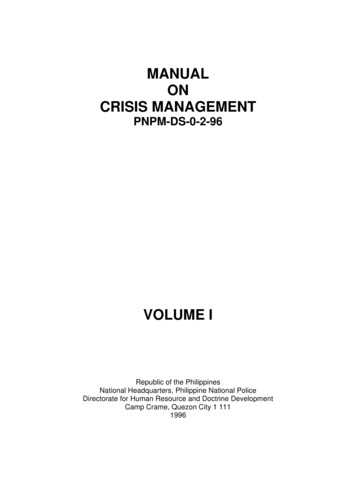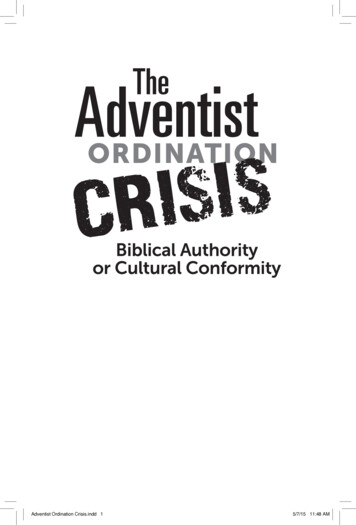
Transcription
Adventist Ordination Crisis.indd 15/7/15 11:48 AM
The Adventist Ordination CrisisBiblical Authority or Cultural ConformityCouncil of Adventist PastorsP.O. Box 19424Spokane, WA 99219Unless otherwise indicated, Scripture is taken from theNew King James Version 1982 by Thomas Nelson,Inc. Used by permission. All rights reserved.Scriptures marked “ESV” are taken from The Holy Bible,English Standard Version , copyright 2001 by Crossway,a publishing ministry of Good News Publishers. ESV TextEdition: 2011. Used by permission. All rights reserved.Scriptures marked “NASB” are taken from the New American StandardBible , Copyright 1960, 1962, 1963, 1968, 1971, 1972, 1973, 1975,1977, 1995 by The Lockman Foundation. Used by permission.Scriptures marked “NIV” are taken from The Holy Bible, NewInternational Version , NIV Copyright 1973, 1978, 1984, 2011 byBiblica, Inc. Used by permission. All rights reserved worldwide.Boldface print in Ellen White statements and otherquotations has been added for emphasis.Cover design by Haley TrimmerLayout by Greg Solie Altamont GraphicsAdventist Ordination Crisis.indd 25/7/15 11:48 AM
ContentsA Note from the Publishers . . . . . . . . . . . . . . . . . . 5Foreword . . . . . . . . . . . . . . . . . . . . . . . . . . . . . . . . . . . . . . . . . . . . . . . . . . . . . . . . . 7IntroductionHermeneutics: How Adventists Study the Bible . . . . . . . . . . 9The Ordination StudySection 1: Ordination Basics . . . . . . . . . . . . . . . 11Section 2: Spiritual Gifts vs. Church Officeswith Qualifications . . . . . . . . . . . . . . . . . . . . . . . . . . . . . . . . . . . .17Section 3: Biblical Qualifications for Elderand Bishop/Overseer . . . . . . . . . . . . . . . . . . . . . . . . . . . . . . . . . .23Section 4: Ellen White’s Example . . . . . . . . . . . . . . . . . . . . . . . . . .37Section 5: Divine Gender Role Differences . . . . . . . 47Section 6: The Headship Principle . . . . . . . . . . . . 53Section 7: What Ellen White Taught AboutGender Roles . . . . . . . . . . . . . . . . . . . . . 73Section 8: The Ordination Question inToday’s Adventist Church . . . . . . . . . . . . . . 91Section 9: Female Ordination— Culture and Consequences . . . . . . . . . . . . . . . . . . . . . . 111Section 10: The Way Forward . . . . . . . . . . . . . . . . . . . . . . . . . . . 1213Adventist Ordination Crisis.indd 35/7/15 11:48 AM
Adventist Ordination Crisis.indd 45/7/15 11:48 AM
A Note from the PublishersThis book is the result of a careful two-year collaborative study of numerous Seventh-day Adventist leaders,including concerned pastors, university professors,conference administrators, physicians, teachers, and lay leaders—men and women alike—from around the world. Eachfelt the message was so important that each was willing towaive royalties in the interest of seeing this work distributedas far and wide as possible.The “featured contributors” listed below constitute onlya portion of those who contributed to this book. Some requested to not be named for various personal reasons.God bless each writer, editor, and consultant for the thousands of combined hours they invested in the cause of disseminating these truths.Featured contributors, listed alphabetically:Doug Batchelor, Stephen Bohr, Allen Davis, LaurelDamsteegt, Jay Gallimore, Michael Hasel, C. RaymondHolmes, Jim Howard, Wayne Kablanow, LarryKirkpatrick, Daniel Knapp Sr., Kent Knight, MikeLambert, Junie Lawson, Don Mackintosh, CarissaMcSherry, Phil Mills, Kevin Paulson, John Peters,Eugene Prewitt, David Read, Edwin Reynolds, AlvaroSauza, Ingo Sorke, Mario Veloso5Adventist Ordination Crisis.indd 55/7/15 11:48 AM
Adventist Ordination Crisis.indd 65/7/15 11:48 AM
Foreword“If the foundations are destroyed, what can therighteous do?”—Psalm 11:3The Seventh-day Adventist Church is now facing whatcould be the greatest crisis of its 150-year history. Although this particular dispute happens to center onthe role of women in the church, a much larger issue is atstake: how we read and interpret the Bible.The New Testament plainly teaches that church leadership offices are to be held by men. Like our doctrines ofthe Sabbath (Gen. 2:2, 3; Exod. 20:11), Creation (Gen. 1–2),and marriage (Gen. 2:20–24), the teaching on male leadership in the church is rooted in the Genesis narrative (1 Tim.2:12–14). Our church’s decision on women’s ordination willeither reinforce or undermine every other foundational Adventist doctrine; it will either confirm or alter how we readthe Scriptures; and it will either affirm or undermine ourhigh view of the Genesis narrative. In other words, the largerissues in the women’s ordination debate are our faithfulnessto the Scriptures and our humble submission to what theyplainly teach.“Male and female He created them,” Genesis tells us (1:27;5:2), and Jesus confirmed this created order (Matt. 19:4).But the Bible’s clear teaching is increasingly under attack.Every institution of our society seems determined to blurtraditional gender roles and even to efface all distinctionsbetween the sexes. Jesus warned that, as we near the end oftime, conditions in the world would resemble the days ofNoah and Sodom (Luke 17:26–32). With same-sex “marriage,” transgender bathrooms, and television programs7Adventist Ordination Crisis.indd 75/7/15 11:48 AM
The Adventist Ordination Crisisthat celebrate homosexuality, polygamy, and transgenderism, our culture is awash in warped messages about gender,sex, and marriage. It is naive to believe that Christians couldlive in a culture so thoroughly saturated with false and confusing gender propaganda without some in the church being influenced by those messages.Against the backdrop of this virtual tsunami of cultural gender confusion, the Adventist church is scheduled toonce again address the issues of biblical gender role distinctions at the 2015 General Conference in San Antonio. Thisis a time to earnestly study and pray that our delegates willmake a firm and final decision choosing Christ over cultureand compromise.Jesus said, “Sanctify them by Your truth. Your word istruth” (John 17:17). Any search for truth must be focusedon Christ and His Word. In any discussion of contestedpoints, we must look to Him and He will give us our priorities and our emphasis. Though He made His instruction deep enough to challenge the scholar, He made it plainenough to engage the understanding of the simple. And Hehas provided His remnant with His testimony in the writings of the Spirit of Prophecy.It is our prayer that He will speak to every reader ofthese pages. And He has promised that His sheep will hearHis voice (John 10:27).—The Publishers8Adventist Ordination Crisis.indd 85/7/15 11:48 AM
IntroductionHermeneutics:How Adventists Study the BibleBefore examining the relevant passages of Scripture, wemust agree on how we should study the Bible to learnand understand its teachings. Historically, Adventistshave followed William Miller’s principles of Bible study,which were endorsed by Ellen White. These principles are:1. All Scripture is necessary and may be understood bydiligent application and study.2. Nothing revealed in Scripture can or will be hiddenfrom those who ask in faith.3. To understand doctrine, bring all the Scriptures together on the subject you wish to know, then let everyword have its proper influence, and if you can formyour theory without a contradiction, you cannot bein error.4. Scripture must be its own expositor, since it is a ruleof itself.Please give special attention to number three. We mustnot interpret Scripture so as to set one text in opposition toanother and then explain why we prefer to heed the one andnot the other. We must form our interpretive theory “without a contradiction,” meaning without reading one text ascontradicting another. As you will see, this principle is crucial in resolving the confusion surrounding this issue.In their efforts to support the ordination of women tothe gospel ministry, some in the church have adopted anew Bible study method. The North American DivisionTheology of Ordination Study Committee calls its newapproach the “principle-based, historical-cultural” method. Unfortunately, this new method clashes with the longstanding Seventh-day Adventist method described in such9Adventist Ordination Crisis.indd 95/7/15 11:48 AM
The Adventist Ordination Crisisplaces as the book The Great Controversy, p. 598, and reaffirmed by the 1986 General Conference “Methods of BibleStudy” document.Adventists have always held that “the Bible transcends itscultural backgrounds to serve as God’s Word for all cultural,racial, and situational contexts in all ages.” In contrast, theNorth American Division (NAD) approach asserts that thetext of Scripture has only a limited reliability because it is“culturally conditioned.” In contrast to Paul’s statement that“all Scripture is given by inspiration of God, and is profitable for doctrine, for reproof, for correction, for instructionin righteousness, that the man of God may be complete,thoroughly equipped for every good work” (2 Tim. 3:16, 17,emphasis added), the NAD’s approach affirms the Bible’s reliability only in “salvational” issues.The NAD report speculates about an alleged “trajectory”in the Bible, but this “principle-based method” is the samemethod non-Adventists employ to set aside the seventh-daySabbath! This new approach is only one notch above thehistorical-critical method, and it is not compatible with the“historical-grammatical” method in longstanding use in theAdventist Church.10Adventist Ordination Crisis.indd 105/7/15 11:48 AM
Section 1:Ordination BasicsOrdination is a grant of ecclesiastical authority, “anacknowledged form of designation to an appointed office and a recognition of one’s authority in thatoffice” (AA 161). After their ordination, Paul and Barnabaswere “authorized by the church, not only to teach the truth,but to perform the rite of baptism and to organize churches,being invested with full ecclesiastical authority” (AA 160).Ordination to gospel ministry is the church’s recognitionthat a man has been set apart for the office of gospel minister—devoting his life to the service of Jesus, to be near Him,to receive His instruction, and to be sent as His personal representative (Mark 8:1; Exod. 19:22).In some respects, ordination to gospel ministry is like aprofessional license, serving to protect people from charlatans. It protects the flock of God from self-appointed personswho would claim to speak for the church but who are not authorized by the consensus of the church elders and overseersto do so.Ordination is an essential element of church organizationand has been important to the Adventist Church from itsearliest days. Immediately upon the organization of our firstconference in Michigan, James White made this motion:“Resolved, that our ministers’ papers consist of a certificate of ordination, also credentials to be signed bythe chairman and clerk of the conference, which credentials shall be renewed annually” (1BIO 455).The English word “ordination” comes from a Latin word,ordo (order, class, rank), not a word from biblical Greek orHebrew. Nevertheless, the concept of the church authorizing11Adventist Ordination Crisis.indd 115/7/15 11:48 AM
The Adventist Ordination Crisissomeone and setting them apart for a holy purpose is foundthroughout Scripture. Many English translations of the Biblehave used the word “ordination” because it was the best wayto get across in English the concept the Bible is describing.Ellen White and the Adventist pioneers found the term“ordain” and “ordination” useful. She describes the simpleceremony by which Jesus ordained the twelve disciples:“When Jesus had ended His instruction to the disciples, He gathered the little band close about Him,kneeling in the midst of them, and laying His handsupon their heads, He offered a prayer dedicating themto His sacred work. Thus the Lord’s disciples were ordained to the gospel ministry” (DA 296).Probably because the word “ordination” comes from aLatin word, it has been asserted that the Adventist Churchgot its practice of ordination from the Roman CatholicChurch. This is absurd. The Adventist pioneers developedthe practice directly from the Bible. They were well aware ofthe Catholic perversion of ordination and rejected it. EllenWhite was explicit in differentiating the early church’s practice of ordination from the corruptions to ordination thatcrept into the church during the apostasy. She says,“At a later date the rite of ordination by the laying onof hands was greatly abused; unwarrantable importance was attached to the act, as if a power came atonce upon those who received such ordination, whichimmediately qualified them for any and all ministerialwork. But in the setting apart of these two apostles,there is no record indicating that any virtue was imparted by the mere act of laying on of hands” (AA 162).12Adventist Ordination Crisis.indd 125/7/15 11:48 AM
Section 1: Ordination BasicsFrom this we can infer that the Adventist Church flatlyrejected the Catholic Church’s sacramental view of ordination. Ordination does not impart magical powers, but is thechurch’s way of authorizing, blessing, and recognizing thepersons to be set apart for service to the church in a particular office.The laying on of hands is not necessarily ordination. Thelaying on of hands for the sick is called “anointing.” The laying on of hands for children is called “dedication.” But eventhe laying on of hands in ceremonies that are essentially ordination, meaning authorizing for office or mission—as withthe laying on of hands on deacons, deaconesses, and medicalmissionaries—is not usually called ordination. Ellen White,and hence much of the rest of the Adventist Church, traditionally used the term “ordination” only with regard to theheadship offices of the church: elder and gospel minister.Frequently Asked Questions1. Is the distinction between ordained and un-ordainedworkers trivial? No. It was so important that the Holy Spirit,during a time of heart searching, fasting, and prayer, sent theAntioch church leadership instructions to ordain Barnabasand Paul (Acts 13:2, 3).2. In the Early Church, were all qualified persons ordained?No. Matthias and Joseph were similarly qualified men, butGod selected Matthias for ordination (Acts 1:21–26). Paul,Barnabas, Simeon, Lucius, and Manaen were similarly qualified men, but God selected Paul and Barnabas (Acts 13:1, 2).In the Old Testament, God selected David from among hissimilarly qualified brothers (1 Sam. 16:5–13).13Adventist Ordination Crisis.indd 135/7/15 11:48 AM
The Adventist Ordination Crisis3. Since neither the Bible nor the Spirit of Prophecy explicitly forbids the ordaining of women, why should thechurch forbid it? First, women are forbidden from holdingpositions that involve authoritative teaching or authority overmen (1 Tim. 2:11–15). By implication, ordaining a woman tosuch a position is forbidden. But let’s assume, for the sakeof argument, that ordaining women to headship roles is not“explicitly forbidden.” It is a common error to mistake God’ssilence as indicating His affirmation. “These things you havedone, and I kept silent; you thought that I was altogether likeyou” (Ps. 50:21). Certainly Jesus’ silence during His mock trial did not indicate His approval (Mark 14:60; 15:6); rather, itwas the greatest rebuke He could give (DA 729). To avoid thismistake in Bible interpretation, we have been instructed “todemand a plain ‘Thus saith the Lord’ ” (GC 595), so it is troubling to see the NAD introduce its official recommendationto ordain women with the statement: “The Bible does notdirectly address the ordination of women.” This “approvalby silence” is employing a method of biblical interpretationthat Jesus did not use. He said, “It is written,” never, “It is notwritten.” He asked, “What is written in the Law? How do youread it?” (Luke 10:26, ESV), not, “What is not written in thelaw? What can you read into it?”Ellen White said plainly, “In the commission to His disciples, Christ not only outlined their work, but gave them theirmessage. Teach the people, He said, ‘to observe all things whatsoever I have commanded you.’ The disciples were to teachwhat Christ had taught. That which He had spoken, not onlyin person, but through all the prophets and teachers of theOld Testament, is here included. Human teaching is shut out.There is no place for tradition, for man’s theories and conclusions, or for church legislation. No laws ordained by ecclesiastical authority are included in the commission. None of theseare Christ’s servants to teach” (DA 826). Christ’s “disciples areto teach only what He commanded them” (RH 8/13/1901).14Adventist Ordination Crisis.indd 145/7/15 11:48 AM
Section 1: Ordination Basics4. Why do some theologians say ordination is not in theBible? The Bible was written in Hebrew, Aramaic, andGreek, not English or any other modern language. But mosttranslations do use the word “ordination,” at least in the NewTestament. Certainly the concept is plainly taught. The Biblespeaks of the ordination of Paul and Barnabas (Acts 13:1, 2);the ordination of Timothy by other elders (1 Tim. 4:14; 2Tim. 1:16); and the ordination of the twelve apostles by Jesus(Mark 3:14). It tells us who should become elders (1 Tim.3:1–6) and warns us not to ordain any man prematurely(1 Tim. 5:22). Ellen White speaks of all these events and callsthem, in her native English, “ordination.” Paul warned theyoung Timothy against those “obsessed with disputes and arguments over words, from which come envy, strife, reviling,evil suspicions” (1 Tim. 6:4).So, whatever we choose to call it, the Bible is clear thatthroughout sacred history, qualified men have been set apartfor leadership in a way others have not been. This was truefor the twelve apostles (Mark 3:14) and the early church (Acts13:3; Titus 1:5). And Ellen White speaks of the hands of ordination being laid on ministers, all of whom—those describedas being ordained—were men. In The Acts of the Apostles,Ellen White compares Moses’s setting aside of the seventyelders with the setting aside of elders in the early church (AA94, 95). Ordination is not of pagan or Roman Catholic origin, but finds its roots in Scripture:“God foresaw the difficulties that His servants wouldbe called to meet, and, in order that their work shouldbe above challenge, He instructed the church by revelation to set them apart publicly to the work of theministry. Their ordination was a public recognitionof their divine appointment to bear to the Gentilesthe glad tidings of the gospel” (AA 160).15Adventist Ordination Crisis.indd 155/7/15 11:48 AM
The Adventist Ordination Crisis5. Could those who were not ordained minister in thesanctuary? No. Korah, a Levite, but not of the family of Aaron, and Dathan and Abiram, who were Reubenites, felt thecall to the priesthood but were excluded from it (PP 395).“The law was very explicit that only those who had been ordained to the sacred office should minister in the sanctuary”(PP 398). However, Korah’s cause resonated with the people;thus, the issue of who could be ordained was the basis forthe first insurrection in Israel. God answered the questiondecisively. A kingdom of priests did not mean every Israelitewas to be ordained to the priesthood. Paul reminds us thatthese stories were “written for our admonition, upon whomthe ends of the world are come” (1 Cor. 10:11). Who couldbe ordained a priest remained controversial throughout thehistory of Israel.16Adventist Ordination Crisis.indd 165/7/15 11:48 AM
Section 2:Spiritual Gifts vs. ChurchOffices with QualificationsIn the New Testament there is no office of “pastor.” In Ephesians 4:8–12, “pastor” is spoken of as a spiritual gift. Theword “pastor” is from the Greek poimen, meaning “shepherd.” The gift of shepherding or pastoring can be manifested by persons who work in other callings, professions,or ministries that are benefited by aspects of caring. Whilespiritual gifts include pastoral care, this is not equivalent tothe biblical office of elder/bishop/overseer that today is oftenreferred to as “pastor.”Spiritual gifts and church offices are not the same thing.In the New Testament we can distinguish between churchoffices and spiritual gifts as follows: Only three church offices are mentioned: apostles(Acts 1:21–25), elders/overseers (1 Tim. 3:1–7; Titus1:5–9), and deacons (Acts 6:1–6; 1 Tim. 3:8–13). Bycontrast, there are many gifts (1 Cor. 12:8–11; 28-30;Rom. 12:6–8; Eph. 4:11) and every believer has received at least one of these gifts (1 Pet. 4:10). Those who occupy offices are ordained, appointed,or chosen based on explicit qualifications (Acts 6:3,14:23; 1 Tim. 3:1–13; Titus 1:5–9). Gifts, however,are bestowed according to the will of the Holy Spiritwithout any stated qualifications (Eph. 4:7; Rom. 12:6;1 Cor. 12:11, 18, 28). Though every believer has at least one gift, not every believer has an office (Eph. 4:7; 1 Cor. 12:7, 11;Rom. 12:4). An elder “cannot be a recent convert” (1 Tim. 3:6), butgifts are bestowed without regard to age or experience.17Adventist Ordination Crisis.indd 175/7/15 11:48 AM
The Adventist Ordination Crisis The offices of elder and bishop/overseer are limited tomen (1 Tim. 2:11–3:7), whereas spiritual gifts are given to both men and women (Acts 21:9, 10; 1 Cor. 11:5).We will never be able to make sense of the ordination debate if we confuse the spiritual gift of “pastoring” with theoffice of elder/bishop/overseer, which is equivalent to themodern Adventist Church’s ordained gospel minister.Frequently Asked Questions1. Is ordination the acknowledgment of an individual’sspiritual gifts? No. This is a basic confusion. Every Christian has been given gifts of the Spirit. Ordination is thechurch’s recognition of one’s call and qualifications to perform a particular office or mission. In the chapter titled,“He Ordained Twelve,” Ellen White says of the disciples,“Their office was the most important to which human beings had ever been called. As in the Old Testament thetwelve patriarchs stand as representatives of Israel, so thetwelve apostles were to stand as representatives of the gospelchurch” (DA 291).2. Does the prophetic gift make ordination unnecessaryor automatic? No. Consider Paul and Barnabas: They hadreceived the outpouring of the Holy Spirit and had been given spiritual gifts. Their ministry was fruitful. “God abundantly blessed the labors of Paul and Barnabas during theyear they remained with the believers in Antioch. But neither of them had as yet been formally ordained to the gospelministry” (AA 160). This shows conclusively that ordinationto the gospel ministry is not necessary to have a fruitful andeffective ministry.18Adventist Ordination Crisis.indd 185/7/15 11:48 AM
Section 2: Spiritual Gifts vs. Church Offices with QualificationsBut spiritual gifts are not a substitute for ordination.Though Paul and Barnabas were both prophets (Acts 13:1),the gift of prophecy did not supersede their ordination, rendering it unnecessary or automatic. “As they ministered tothe Lord and fasted, the Holy Spirit said, ‘Now separate to MeBarnabas and Saul for the work to which I have called them.’Then, having fasted and prayed, and laid hands on them, theysent them away” (Acts 13:2, 3). Without ordination, Paul andBarnabas would not have had church authorization to baptize new members or organize new congregations (AA 160).3. If the Spirit has gifted a woman to preach, who are we tostop her ordination? Preaching does not require ordination.Preaching is a spiritual gift, and no one is asking that womenbe forbidden to preach, either to the church or the world. Itis the headship role of elder/overseer that the Bible reservesfor men (1 Cor. 11:3; 1 Tim. 2:12, 13).“And he gave some, apostles; and some, prophets; andsome, evangelists; and some, pastors and teachers” (Eph. 4:11;1 Cor. 12:28–30). To the extent that preaching is part evangelism and part teaching, preaching is a spiritual gift. Butthe spiritual gift of preaching is not a sufficient reason toordain someone. There are other qualifications. For example, Paul explained a man who desires to be an elder “musthave a good reputation with those outside the church, sothat he will not fall into reproach and the snare of the devil”(1 Tim. 3:7 NASB). His qualifications must be demonstratedto the congregation before the church will consider him foran office.4. Isn’t it mean and unchristian to follow the Bible’s orderwhen some women who feel called by God to ordinationcannot be ordained? Was God mean when He singled outAdam as head of the original male-female relationship, calling to him first when he and his wife sought to hide from19Adventist Ordination Crisis.indd 195/7/15 11:48 AM
The Adventist Ordination CrisisGod’s presence? (Gen. 3:9). Was God unkind when He forbade any but the male descendants of Aaron to serve aspriests in the sanctuary? (Ex. 28:1; Num. 3:3). (Korah andhis followers certainly thought so.) Was God unkind whenHe struck King Uzziah with leprosy for daring to officiate inthe temple as though he were a priest? (2 Chron. 26:17–20).Was the apostle Paul mean when he forbade women to holdauthority over men on the basis of the original created order? (1 Tim. 2:12, 13). Isn’t it unfair for God to distinguishbetween Sabbath-keepers and those who violate the fourthcommandment—sincere as they might be? We should allowGod to define a church’s faith and practice.5. Isn’t it a positive evidence that women are called to beordained when they experience success in soul-winning?No. Notice what Ellen White says about men:“It is not a positive evidence that men are called of Godbecause they have some success; for angels of God arenow moving upon the hearts of His honest children toenlighten their understanding as to the present truth,that they may lay hold upon it and live. And even ifself-sent men put themselves where God does notput them and profess to be teachers, and souls receivethe truth by hearing them talk it, this is no evidencethat they are called of God. The souls who receive thetruth from them receive it to be brought into trial andbondage, as they afterward find that these men werenot standing in the counsel of God” (EW 97, 98).Visible success in any line of work cannot contradict thewritten counsel of God regarding gender roles in ministry.It is entirely possible for an ordained woman to have an outwardly successful preaching ministry and still not be sentof God.20Adventist Ordination Crisis.indd 205/7/15 11:48 AM
Section 2: Spiritual Gifts vs. Church Offices with Qualifications“Likewise, son of man, set your face against thedaughters of your people, who prophesy out of theirown heart; prophesy against them” (Ezek. 13:17).6. If the call to pastoral leadership comes from God,who are we to deny ordination to women whom God hascalled? God never calls men or women to responsibilitiesthat run contrary to His written Word. The alleged validityof any call to service in the Lord’s work must be measuredagainst the collective judgment of the inspired writings. Letus again consider Ellen White’s statements regarding the harmony between the written Word’s pronouncements and theSpirit’s call:“Since it was the Spirit of God that inspired the Bible,it is impossible that the teaching of the Spirit shouldever be contrary to that of the word. The Spirit wasnot given—nor can it ever be bestowed—to supersedethe Bible; for the Scriptures explicitly state that theword of God is the standard by which all teaching andexperience must be tested. Says the apostle John, ‘Believe not every spirit, but try the spirits whether theyare of God: because many false prophets are gone outinto the world’ ” (GC vii).7. In the Old Testament, was an outpouring of the HolySpirit sufficient to qualify the possessor for ordination?No. King Saul was filled with the Spirit but was forbiddento offer sacrifice. “The Spirit of the Lord will come uponyou. You shall go down before me to Gilgal; and surelyI will come down to you to offer burnt offerings and makesacrifices of peace offerings. Seven days you shall wait, till Icome to you” (1 Sam. 10:6–8). Two years passed. As predicted, there was a time of crisis. The Philistines were attacking,while Saul’s army was deserting.21Adventist Ordination Crisis.indd 215/7/15 11:48 AM
The Adventist Ordination Crisis“Then he waited seven days, according to the time setby Samuel. But Samuel did not come to Gilgal; and thepeople were scattered from him. So Saul said, ‘Bringa burnt offering and peace offerings here to me’ ”(1 Sam. 13:8, 9).Saul offered the burnt offering. Samuel showed up immediately after this act and told the king:“You have done foolishly. You have not kept the commandment of the Lord your God, which He commanded you. For the Lord would have establishedyour kingdom over Israel forever. But now your kingdom shall not continue” (1 Sam. 13:13, 14).Ignoring God’s specific instructions as to who was ordained to perform the priestly functions was so serious thatit brought an end to Saul’s dynasty.22Adventist Ordination Crisis.indd 225/7/15 11:48 AM
Section 3:Biblical Qualifications forElder and Bishop/Overseer“This is a faithful saying: If a man desires the positionof a bishop, he desires a good work. A bishop thenmust be blameless, the husband of one wife, temperate, sober-minded, of good behavior, hospitable, ableto teach; not given to wine, not violent, not greedy formoney, but gentle, not quarrelsome, not covetous; onewho rules his own house well, having his children insubmission with all reverence (for if a man does notknow how to rule his own house, how will he take careof the church of God?); not a novice, lest being puffedup with pride he fall into the sam
his book is the result of a careful two-year collabora-tive study of numerous Seventh-day Adventist leaders, including concerned pastors, university professors, conference administrators, physicians, teachers, and lay lead-ers—men and women alike—from around the world. Each f
